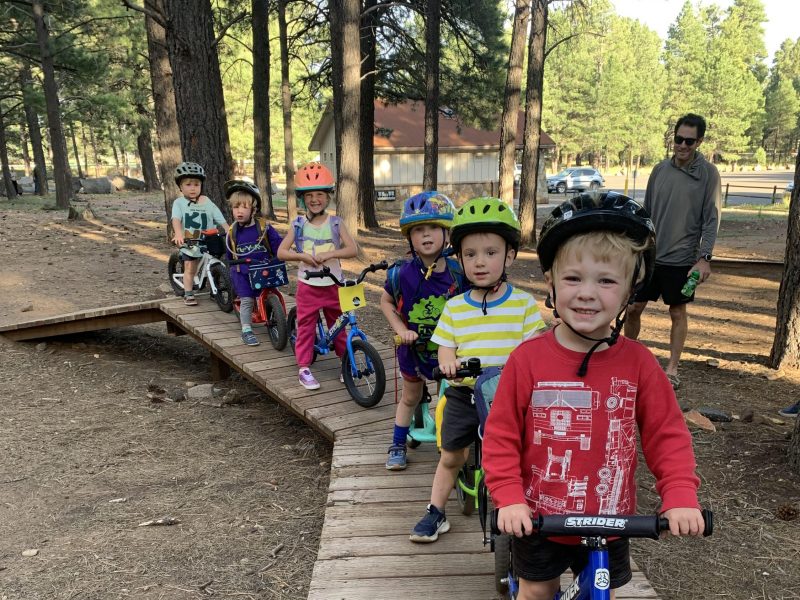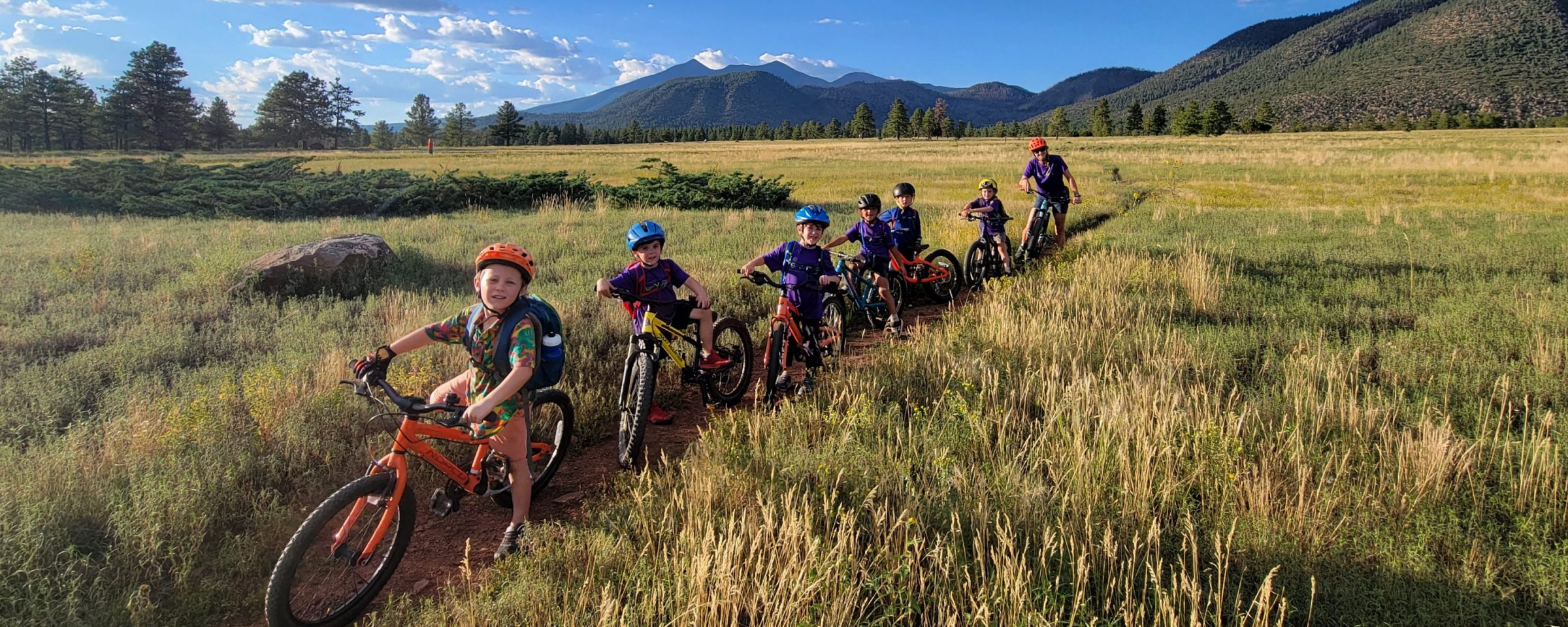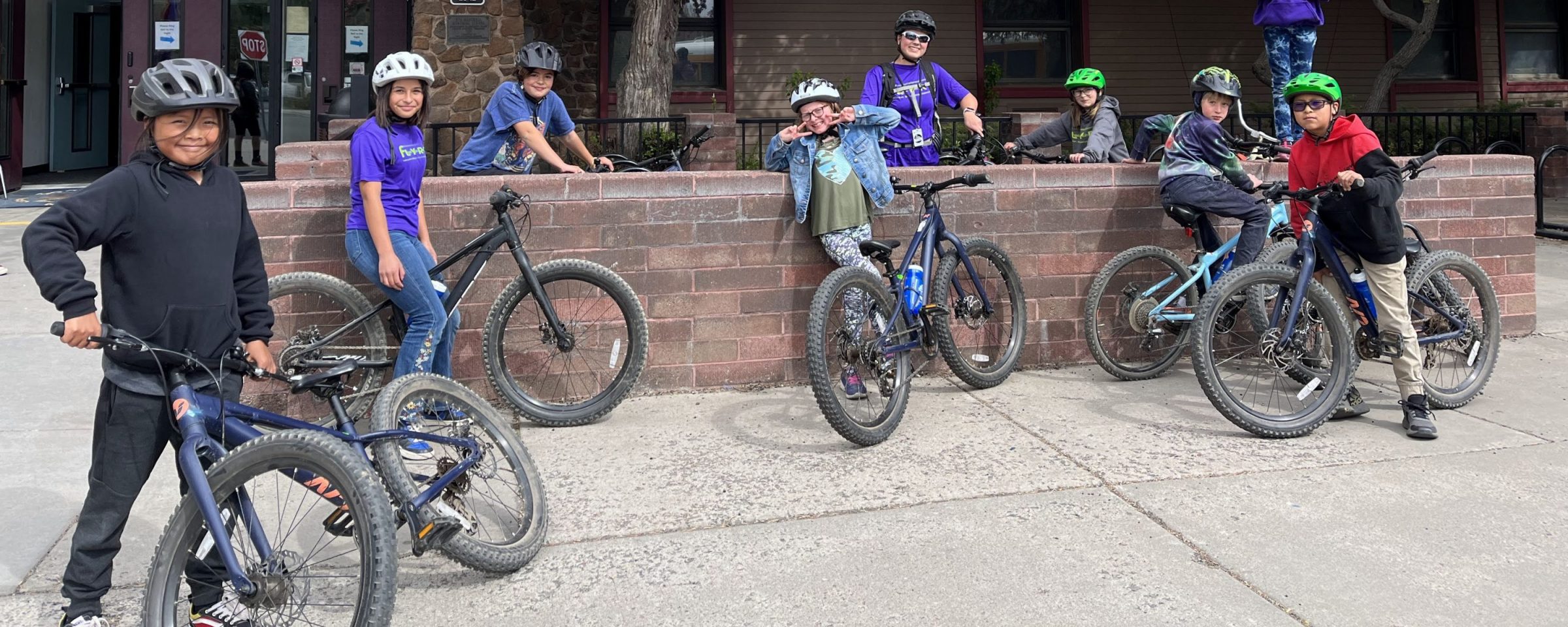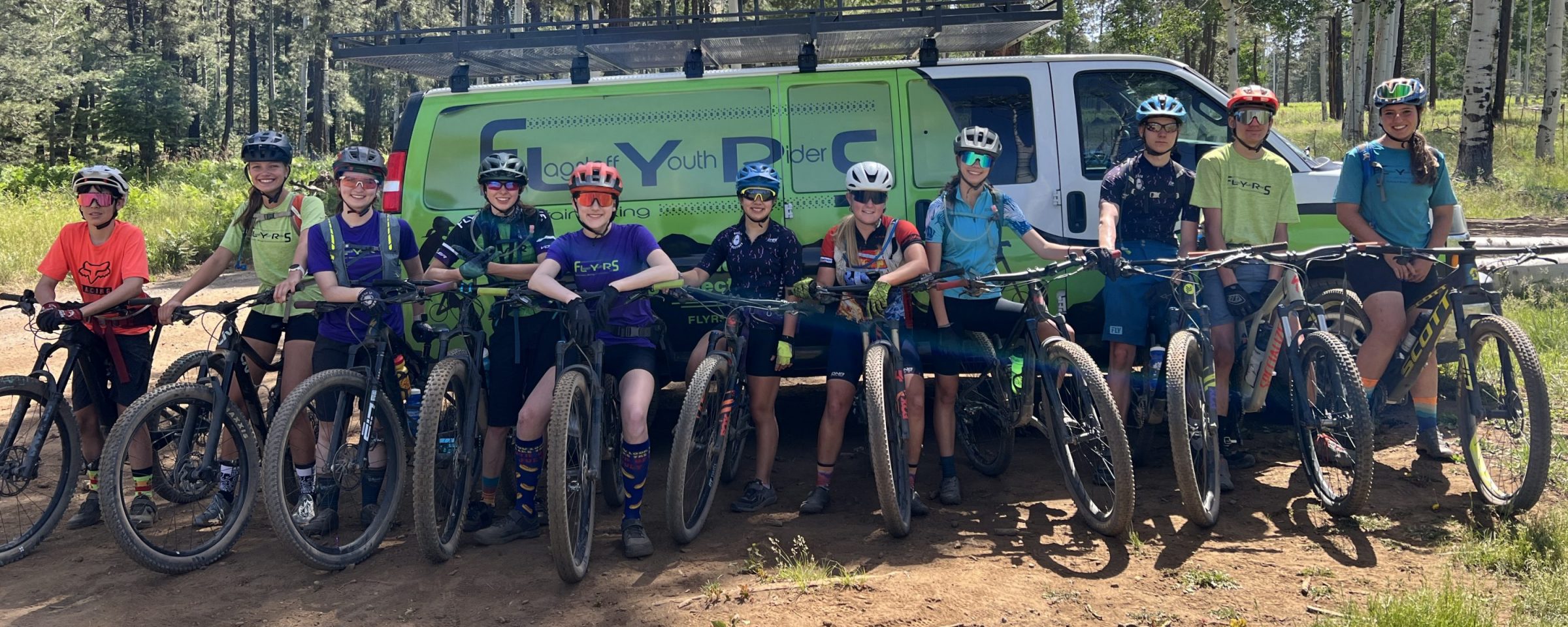Researchers’ voices in health equity
The Fairness First blog represents a space where researchers share with the broader community why health equity research matters to them, how do they connect to health equity, and what is the value of community engagement in the research process.
March 7, 2025
Riding Together: The Power of Mountain Biking in Youth Development
Katherine Mommaerts and Hannah Hendrickson discuss their CCPS partnership
March is Social Work Month! Social work is essential to public health, helping individuals and communities access resources, navigate challenges, and improve overall well-being. By addressing social factors like housing, education, and mental health, social workers play a key role in strengthening public health systems and reducing health disparities.
In this month’s blog, we welcome Community Campus Partnership Support (CCPS) Program* partners Dr. Katherine Mommaerts and Hannah Hendrickson. The partners discuss the impact of Flagstaff Youth Riders (FLYRS) on mental, physical and social well-being of youth.
*The CCPS program funds partnership building activities that spark collaborative health equity research ideas and build capacity for community engaged research.
About the Team and FLYRS
Flagstaff Youth Riders (FLYRS) is a nonprofit mountain biking organization based in Flagstaff, Arizona, that serves over 1,000 youth ages 2-18. FLYRS is an age-based program geared toward building team camaraderie while teaching mountain biking skills through a structured curriculum led by trained coaches. Dr. Katherine Mommaerts is an assistant professor in the social work department at NAU, and FLYRS coach and board member. For the past three years, Hannah Hendrickson has served as the school program coordinator and has recently transitioned to the program director of FLYRS. Together, the CCPS partners have a shared commitment to youth development through community engaged programming and recreation.
FLYRS and Partnership
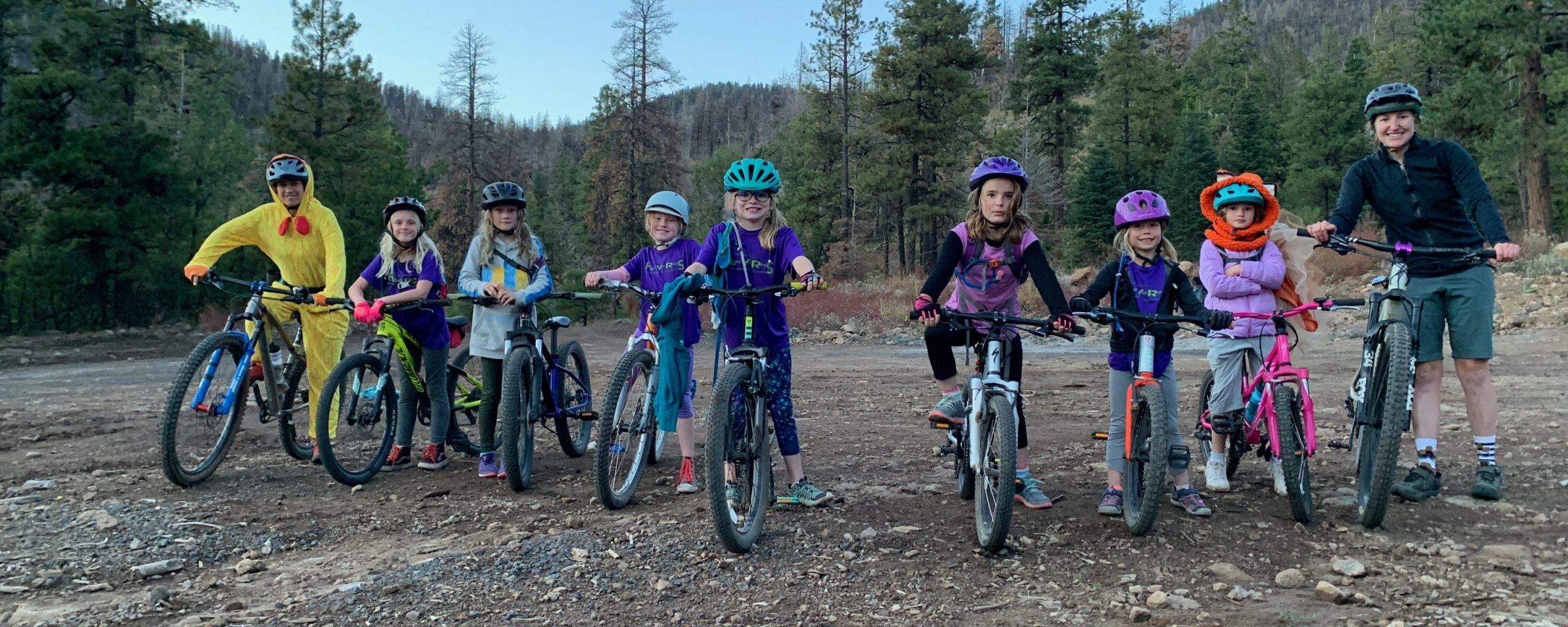
Here the partners discuss how FLYRS and its partnership with NAU came to be. Hannah and Katherine also share what personally motivates them in promoting well-being through FLYRS.
HANNAH: The inspiration for FLYRS came to be when our original Executive Director, Tyler Nelson, noticed there were no biking programs for youth in the area. He had two young boys and a bunch of their friends who loved riding bikes, so he started a small group with a few families in 2016. From there he noticed the kids increased confidence both on and off the bike, and how this confidence and mental well-being translated so well into their lives. Since then, we have created more programming and program options to fit the needs of our community, supporting over 1,000 youth each year.
For me, the biggest personal motivator is seeing the kids smiling, having fun with their peers, and interacting together as a team. Biking can provide well-needed exercise – it gets kids away from screens and into nature where clean air, sunshine, and fresh blood flow can hugely impact their mental health. Over the past three years with FLYRS, I’ve had the privilege of watching kids grow through our programs, and it’s incredible to see how these experiences help shape happy, healthy, and compassionate individuals.
KATHERINE: The partnership emerged from a shared commitment to youth development, health equity, and outdoor recreation, along with a desire to engage in research and collect data to examine the impact of mountain biking on youth development. Through conversations with the FLYRS staff, we recognized an opportunity to collaborate, combining academic resources with community-driven initiatives to expand access and impact on how mountain biking supports physical, mental, and social well-being for youth.
I am motivated by the belief that everyone deserves access to opportunities that support their well-being, regardless of their background or circumstances. Seeing the positive impact of inclusive programs on individuals and communities drives my commitment to creating equitable, supportive spaces where people can thrive.
Physical, Mental and Social Well-being Through Mountain Biking
Hannah discusses how FLYRS addresses youth development and supports well-being.
HANNAH: One of the things that I think makes FLYRS so successful is that we organize our groups by age as opposed to skill. In this way, we’re creating this opportunity for inclusiveness, allowing kids who maybe ride a little bit differently than other kids to ride alongside each other, fostering team bonding, friendships, independence and healthy risk taking. This naturally supports the development of mountain biking skills and fitness, helping each rider succeed. Riding with peers regardless of skill promotes social and mental well-being and fits with our mission, which is to develop resilient, caring, and growth-oriented youth through mountain biking. Although we are predominantly focused on coaching mountain biking, what we’ve noticed is that emotional, physical and social well-being are all built together. Having a group of kids who are close in age working together, we find that all of those skills are enhanced through our programs.
Through my engagement with youth and families, I’ve learned that their top priorities for health and wellness—especially in the context of biking, outdoor activities, and group settings—are safety, fun, and time spent outside. These elements are crucial because they foster confidence, friendships, perseverance, and determination. Riding in a supportive environment encourages youth to push through nerves, tackle challenges on the trail, and step outside their comfort zone to develop resiliency and a lifelong appreciation for outdoor recreation.
Addressing Access to Health Promoting Activities
Katherine and Hannah discuss the distribution of resources for mountain biking and subsequently access to activities that promote health. They also share real examples of youth that have positively been impacted by FLYRs and mountain biking.
KATHERINE: Health equity in the context of a youth mountain biking program means ensuring that all young people, regardless of their background, have the opportunity to participate in and benefit from, as Hannah was saying, the physical, mental, and social advantages of mountain biking. In the context of FLYRS, this includes addressing barriers such as access to equipment, safe riding spaces, coaching, and financial constraints. It also involves creating an inclusive and supportive environment where youth from diverse socioeconomic, racial, and ability backgrounds feel welcomed and empowered. By prioritizing equitable access, the program can promote lifelong health, well-being, and a sense of community among all participants.
HANNAH: Some of the biggest barriers to mountain biking include the cost of equipment, transportation, and the need for a trusted adult to ride with. Our school based programs highlight the importance of health equity by offering 7 week programs in the spring and fall at no cost to students. FLYRS is partnered with six schools in the area where we provide bikes, helmets, and awesome and knowledgeable coaches who are excited to share their passion of riding bikes. In our traditional paid programs, we also recognize the barrier of having proper equipment, so we do our best to loan bikes or other equipment to children who present that need.
We started a program at Summit High School in 2022 focused on riding bikes along with practical bike maintenance. When it came time to ride on the first day, we had one student – let’s call him James – ask, “Why don’t these bikes have training wheels on them?” What became apparent to me was James probably hadn’t been on a bike since he was young enough to have training wheels.
During our seven weeks together, I learned more about James and his situation, how he and his mom were homeless and living in a hotel. He told me he feels there’s no reason why he should learn how to ride a bike. The Dean of students told me they were working with James through some heavy trauma, and that he just might not learn to ride. Although I heard James telling me he didn’t think it was important, I could see how determined he was to learn.
On the last day of class, I looked over to see that while most students were chatting before our ride, there was James, the only kid riding around in the parking lot. The school ended up gifting him a bike, and I’ve seen James on that bike around town since. The freedom and confidence James now had came from something as simple as a bike, and knowing how to ride it.
I think we’re really lucky to be in a place like Flagstaff where we have a pretty diverse community. Trying to reach out and engage with underrepresented groups, I think is really important. A big thing with FLYRS is creating a space for people where they feel safe, and also feel welcome. If kids feel confident, safe, and welcome, they have fun and there’s a chance they’re going to learn something.
Successful Partnerships
Katherine and Hannah discuss what makes a partnership successful.
HANNAH: There are a lot of exciting things going on with this partnership for 2025. Recently, we have held several Community Advisory Board (CAB) meetings to discuss how biking can affect youth mental health. Our CAB group is a mix of people from NAU, FLYRS, FUSD, and other biking programs in the area including Durango Devo, Silver Stallion, Gro Girl Gro, Out Ride, and WheelFun. This is exciting for us to bring together like minded people to think about and discuss this topic in a larger context. Katie and I are also headed to a conference hosted by the National Alliance on Mental Illness to take a more in-depth look at issues some of our riders face, and how coaches and the sport of mountain biking can support them.
KATHERINE: Both NAU and FLYRS actively contribute resources, expertise and support to create shared goals, so this partnership grows just beyond the short term initiative, and it will become this ongoing collaboration. When we think about success, we also think about how our youth riders show improvements in physical health, mental health, confidence in their biking skills, and life skills such as resiliency and teamwork. FLYRS really instills the importance of being a good steward. So we participate in trail days and help the kids understand trail etiquette and how we care for the forest, just like we would care for our own bodies and our minds. We care for our gear, we care for the forest, we care for our team, things like that.
Our partnership contributes to studies on youth development, health equity, outdoor recreation and sports science. It provides an opportunity for faculty and students to work alongside FLYRS to develop and apply knowledge in real-world settings, and we’re hoping that from our partnership that our findings will inform best practices and youth recreation and public health. We hope this partnership can serve as a model for others to use and adapt for other communities.
If you would like to learn more about the Flagstaff Youth Riders or ways to get involved with the organization, please visit their website! https://www.flyrsaz.com/
